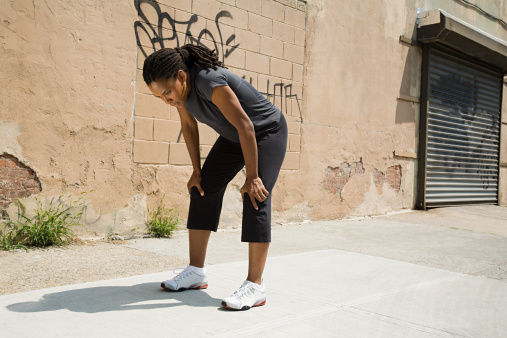Trust me, this is one exercise video you do not want to miss! (Eurotrain!!!)
You’ve seen the workout program ads: in between shots of glistening, contracting abdominals and hyper smiling people who only sweat in socially acceptable places – your amped up cleavage if you are a woman, your shaved pecs if you are a man – comes The Promise. What, you ask, can a DVD workout/exercise book/smiling B-list celeb promise me when it comes to cardio other than a perfect body, chiclet teeth and a spray tan so authentic that real sunshine is jealous? Why, the promise of amazing ultra-high superbad caloric burn of course!
I was reminded of this the other day as the Gym Buddies and I were sweating away on the elliptical machines (not our go-to workout but they were refinishing all the floors so it’s what we were left with) and one of those ubiquitous exercise program infomercials came on. While we were giggling about watching people on TV exercise while actually exercising, large letters flashed up on the screen. “BURN up to 1,000 CALORIES AN HOUR!” flashed over all those heaving chests – the “up to” in conveniently small type of course.
This infomercial – may Billy Mays rest in peace – is not unique. All fitness programs, televised and otherwise, seem to make some kind of caloric promise. But how accurate are these claims? And does knowing the potential calorie burn of a workout help you make a better choice on how to sweat?
Can You Really Burn 1,000 Calories An Hour?

Anecdotal evidence first: According to my overly generous heartrate monitor of which I was once so attached to that I would turn around and go home to get the chest strap if I accidentally forgot it despite the fact that being small chested meant that it looked as if I had a 3rd nipple, I have burned over 1,000 calories in a single workout. The scene was “Holiday Turbokick” a special brand of torture that Turbo Jennie likes to put us through on occassions like the day before Easter, where we do 8 “turbos” (a high-intensity inverval lasting between 30 seconds and 2 minutes) interspersed with 4 finales or some such craziness. By the end I am turboing in a puddle of my own filth and can wring out my tank top like a Shamwow. It’s enough to make a girl puke up her turkey before she even eats it, is what I’m saying. But by the time we hit cool down, I had burned just over 1,000 calories.
So it would seem possible – although unlikely (who wants to work out so hard you vomit every day?) – to attain that magic number. Except for two problems. 1) My heart rate monitor wasn’t terribly accurate. While I trusted it’s ability to read my actual beats per minute, its calorie burn function was apparently calculated based off a 6’6″ male Russian ice swimmer. To prove this, I switched heart rate monitors with Gym Buddy Allison, who wears a Polar, and racked up 200-400 less calories per hour than my watch gave me.
2) Even the venerable Polar can’t really tell you your caloric burn as metabolism is so individual as to render any mathematical formula at least slightly inaccurate. The research in this area is more prolific than one might think. Companies that make a living off of guaranteeing a good workout have invested a lot of energy into trying to figure out what number of calories people can expect to expend using their machines or programs. What they have discovered however is that while they can predict how many calories an individual, say Michael Phelps, is burning, those results are very difficult to generalize. In addition to individual metabolisms there are simply too many other variables. Therefore, the honest companies will give you a range of calories. The disingenuous ones will use that sneaky little phrase “up to” and then give you a Michael Phelpsian number just to make you feel good.
Does it Matter How Many Calories You Burn?
 Every fitness expert will tell you that weight loss, gain or maintenance comes down to simple math. It’s all about the calories you take in through food in relation to those you expend through daily life and exercise. This over simplified truism often leads people to think things like, “If the treadmill says I burned 250 calories, then that means I can eat a 200 calorie muffin and still come out losing!” This, in turn, has made calorie burn the gold standard in assessing a fitness program’s worth.
Every fitness expert will tell you that weight loss, gain or maintenance comes down to simple math. It’s all about the calories you take in through food in relation to those you expend through daily life and exercise. This over simplified truism often leads people to think things like, “If the treadmill says I burned 250 calories, then that means I can eat a 200 calorie muffin and still come out losing!” This, in turn, has made calorie burn the gold standard in assessing a fitness program’s worth.
But dig a little deeper and you will realize that not only is calorie burn not the best indicator of a workout’s power, it actually distracts you from other benefits of exercise. For instance, weight lifting typically doesn’t burn comparatively as many calories as cardio for the same amount of time and yet it has many advantages like increased strength, muscle mass and overall functionality. Similarly, HIIT (high intensity interval training) burns a smaller amount of calories during the actual workout but causes a much greater spike in HGH (human growth hormone) than twice the amount of traditional medium-intensity cardio. Lastly cardio exercise is good for many things like increasing your oxygen utilization and building endurance, besides just burning off last night’s dessert.
Is It A Good Thing To Burn 1,000 Calories An Hour?

Ignoring for a moment whether or not it’s even possible to burn that many calories, one must ask if it is even a worthwhile fitness goal to strive to burn a particular high number of calories. To get that kind of calorie burn, one would have to push very hard in a high intensity type of cardio. Much has been said – and ignored – about the dangers of too much aerobic exercise in the highest heart rate zones. It elevates the stress hormone cortisol, causes systemic inflammation, necesitates longer recovery and increases your risk of injury, just to give you the short version.
In addition, an often overlooked fact by dieters and diet purveyors alike is that the more you exercise, the hungrier you get. From my personal experience the more calories I burn, the more my body wants to replace them – and fast. What’s the quickest source of glycogen for our depleted muscular system? Sugar. I have found that after a long training run, it’s almost impossible for me to stay away from the Jelly Bellies and other simple carbs for the rest of the day. However, when I strength train and/or keep my training volume low my sugar cravings diminish significantly (unless I’m PMSing but that’s a different story entirely). Research backs me up by showing that dieters who create a calorie deficit purely from exercise don’t lose weight – because their bodies eat to adjust. So, what’s the point in burning (up to) 1,000 calories if my body is immediately going to want to replace (at least) 1,000 calories with whatever food is easiest for me to scarf down?
What Works For Me
 Calorie burn doesn’t matter much to me anymore. I haven’t worn a heart rate monitor in over two years and don’t miss it a bit. My main measure these days of a good workout is the fun measure (which by the way, hula hooping is scoring off the charts in – it is ridiculously fun!). Granted, I’ve been exercising long enough to know what it feels like for me to be at “maximal effort” or “90% of my max heart rate” or even what my aerobic threshold (AT) feels like. I can see how wearing a monitor could help someone new to fitness learn to recognize how hard to push yourself (hint: it’s always harder than you think). But for me it ended up just being one more number for me to obsess over so just like I no longer count calories, weigh myself, or even measure my body fat percentage, I also don’t worry about my calorie burn.
Calorie burn doesn’t matter much to me anymore. I haven’t worn a heart rate monitor in over two years and don’t miss it a bit. My main measure these days of a good workout is the fun measure (which by the way, hula hooping is scoring off the charts in – it is ridiculously fun!). Granted, I’ve been exercising long enough to know what it feels like for me to be at “maximal effort” or “90% of my max heart rate” or even what my aerobic threshold (AT) feels like. I can see how wearing a monitor could help someone new to fitness learn to recognize how hard to push yourself (hint: it’s always harder than you think). But for me it ended up just being one more number for me to obsess over so just like I no longer count calories, weigh myself, or even measure my body fat percentage, I also don’t worry about my calorie burn.
All of which is not to say that exercise – even an occasional session of long, intense cardio – shouldn’t be done. Ask any triathlete, marathon runner or Iron(wo)man if their race was worth it and most of them will give you an enthusiastic yes. But it isn’t because they burned 3,000 calories, it’s because they were having fun and it gave them a sense of accomplishment. Does it mean that I don’t get a great workout from Holiday Turbokick if I don’t burn quadruple-digit calories? No! I’m still increasing my endurance and having a lot of fun to boot. I’m not even saying that you shouldn’t measure your calories burned – you may find it motivating, educational or just entertaining. My point: When we are evaluating the merit of a particular fitness program, there are a lot of better factors to consider than supposed maximum calorie burn.
Do you have a favorite fitness infomercial? Is your calorie burn during a workout important to you? If so, how do you measure it? How do you measure the success of your workout?



